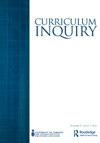缺席的课程,或者如何停止假装不知道
IF 1.6
3区 教育学
Q2 EDUCATION & EDUCATIONAL RESEARCH
引用次数: 0
摘要
该课程远不止是表面上指导教师工作的政策文件和课程计划,这是课程研究的真理。有很多概念和框架可以用来研究什么是课程的许多不同方面,以及什么以某种方式塑造教育体验。作为编辑,我们经常不仅被概念的范围所打动,还被“隐藏”课程等概念的定义范围所打动(Gaztambide Fernández,2017)。这一系列广泛的概念和框架有助于我们理解,课程不仅仅是课程,还有课程力量以比官方文件和其他书面文本更深刻的方式塑造教育体验。然而,作为教育工作者,我们经常被我们工作的机构的紧迫性以及我们所做工作的政治紧迫性所困扰。无论我们在大学或学校工作,无论我们的工作是在社区工作,还是专注于全球运动,关注课程的缺席往往不仅具有挑战性,有时甚至超出了我们的能力,资源和时间限制。因此,我们经常发现自己的工作就好像其他力量对我们作为教育工作者的工作没有产生深远影响一样,甚至借用本期开篇文章的标题,“假装不知道”这些力量的存在(见本期Okello)。本期CI的四篇文章为我们提供了一个视角,让我们思考课程的各个层面,这些层面不仅隐藏在我们通常的方法或看法之外,而且深刻地塑造了教育体验。这些缺席的存在,就像房间里的大象一样,在塑造教育体验方面往往是如此强大,以至于承认它们可能会导致我们放弃任何对抗或抵抗它们力量的尝试。种族主义、性别歧视、性别主义、能力主义、劳工剥削和殖民主义,仅举几个塑造教育体验的意识形态和社会过程的例子,是如此普遍,但往往是如此隐秘,以至于作为教育工作者,我们可能会感到被迫表现得好像他们不在一样;我们可能会假装我们甚至不知道他们是如何影响我们的,并忽视他们缺席的存在。无论是为了效率、实用性,还是为了管理面对这些力量时的无能为力感,我们都可能假装根本不知道它们在那里,并像其他人一样继续前进。本文章由计算机程序翻译,如有差异,请以英文原文为准。
The absent-present curriculum, or how to stop pretending not to know
That curriculum is far more than the policy documents and lesson plans that ostensibly guide the work that teachers do is a truism of curriculum studies. There is a plethora of concepts and frameworks for examining the many different aspects of what counts as curriculum and what shapes, in some way or another, educational experience. As editors, we are often struck not just by the range of concepts, but also by the range of definitions of concepts such as the “hidden” curriculum (Gaztambide-Fernández, 2017). This broad constellation of concepts and frameworks helps us to understand that there is more to curriculum than the curriculum, and that there are curricular forces that shape educational experience in far more profound ways than what is expressed in official documents and other written texts. As educators, however, we are often pressed by the exigencies of the institutions in which we work as well as by the political urgency of the work we do. Whether we work in universities or schools, or whether our work is situated in communities, or focused on global movements, attending to the absent presences of curriculum is often not just challenging, but at times beyond our capacities, resources, and time constraints. And thus, we often find ourselves working as if other forces were not having a profound effect on our work as educators, and even, to borrow from the title of the opening article in this issue, “pretending not to know” that such forces exist (see Okello, this issue). The four articles in this issue of CI offer us a lens through which to consider dimensions of curriculum that are not just hidden from our usual approaches or perceptions, but that profoundly shape educational experience. These absent presences, like elephants in a room, are often so overwhelmingly powerful in shaping educational experience that to acknowledge them might lead us to give up on any attempt to counter or resist their force. Racism, sexism, genderism, ableism, labour exploitation, and colonialism, to name only a few of the ideologies and social processes that shape educational experiences, are so ubiquitous and yet often so stealth that as educators we can feel compelled to act as if they are not there; we might pretend that we don’t even know how they impact us and ignore their absent-presence. Whether for the sake of efficiency, practicality, or to manage the sheer feeling of powerlessness in the face of such forces, we might pretend not to know they are even there at all and proceed as if otherwise.
求助全文
通过发布文献求助,成功后即可免费获取论文全文。
去求助
来源期刊

Curriculum Inquiry
EDUCATION & EDUCATIONAL RESEARCH-
CiteScore
3.10
自引率
17.60%
发文量
37
期刊介绍:
Curriculum Inquiry is dedicated to the study of educational research, development, evaluation, and theory. This leading international journal brings together influential academics and researchers from a variety of disciplines around the world to provide expert commentary and lively debate. Articles explore important ideas, issues, trends, and problems in education, and each issue also includes provocative and critically analytical editorials covering topics such as curriculum development, educational policy, and teacher education.
 求助内容:
求助内容: 应助结果提醒方式:
应助结果提醒方式:


